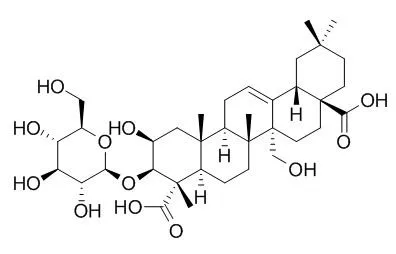| In vitro: |
| Acta Physiol (Oxf). 2009 Aug;196(4):419-25. | | Tenuifolin, an extract derived from tenuigenin, inhibits amyloid-beta secretion in vitro.[Pubmed: 19208093] | Previous studies have shown that tenuigenin, a crude extract of Polygala tenuifolia Willd. that is commonly used in traditional Chinese herbal medicine for memory loss, can reduce the secretion of Abeta from cultured cells. However, the mechanism underlying this effect and the active compound derived from tenuigenin is unknown. In this study, a purified component of tenuigenin, Tenuifolin, was examined and revealed to be an effective compound in vitro.
METHODS AND RESULTS:
Abeta secretion from three sets of COS-7 cells, each carrying a plasmid expressing a different form of APP was examined following the treatment with Tenuifolin. Initially, Tenuifolin was determined to have no inherent toxicity to either the transfected or wild type cells at the effective concentrations. Cells were then treated with 0.5-2.0 microg mL(-1) Tenuifolin for 12 h and their media were examined via an ELISA for Abeta1-40 and Abeta-42.
We found that treatment with 2.0 microg mL(-1) Tenuifolin significantly decreased Abeta secretion from COS-7 cells without altering the ratio of Abeta1-40 and Abeta-42. This effect is most probably due to inhibition of the beta-site APP cleaving enzyme as Abeta secretion was not inhibited from cells expressing the C99 fragment.
CONCLUSIONS:
Tenuifolin is an effective compound from tenuigenin. We believe that this finding should lead the way for future experiments to determine the exact mechanism for Tenuifolin's effect on Abeta secretion. | | Molecules 2012, 17(3), 3524-3538 | | Terpenoids as Potential Anti-Alzheimer’s Disease Therapeutics[Pubmed: 17033524] | | Alzheimer’s disease (AD) is one of the most well-known neurodegenerative diseases and explains 50–60% of dementia in patients. The prevalence rate of AD is positively correlated with age and AD affects ≥ 40% of those over 85 years old. The major AD therapeutics available on the market are acetylcholinesterase inhibitors, such as tacrine and donepezil. New therapeutic agents that can block the disease-inducing mechanisms are essential. Diverse efforts have been made to discover anti-AD agents from natural sources. In this review article, we describe some representative terpenoids such as ginsenosides, gingkolides, and canabinoids as potential anti-AD agents. These compounds exhibit promising in vitro and in vivo biological activities, but are still waiting clinical trials. Additionally, we also discuss some terpenoids including cornel iridoid glycoside, oleanolic acid, Tenuifolin, cryptotanshinone, and ursolic acid, which are under investigation for their in vitro and in vivo animal studies. |
|
| In vivo: |
| Pharmacol Biochem Behav. 2015 Jan;128:14-22. | | Tenuifolin, a secondary saponin from hydrolysates of polygalasaponins, counteracts the neurotoxicity induced by Aβ25-35 peptides in vitro and in vivo.[Pubmed: 25444865] | Alzheimer's disease (AD) is associated with damage to hippocampal neurons and declines in cognitive functions. The accumulation of amyloid peptides is regarded as a crucial event in the initiation of AD. The neurotoxicity induced by Aβ25-35 peptides was used to screen for cytoprotective factors in vitro, and the cognitive deficits induced by the injection of Aβ25-35 into the hippocampus were used to evaluate effect on learning and memory. Our previous study revealed that hydrolysate of polygalasaponins (HPS) clearly improve the cognitive deficits induced by the injection of Aβ25-35 in mice, but the potential active constituent of HPS remains unclear. The purposes of this study were to separate and purify the secondary saponins of HPS, screen for neuroprotective effects of the constituents in vitro, and to evaluate the effect of cognition in vivo.
METHODS AND RESULTS:
Various chromatographic methods were used to separate and purify the HPS. The neuroprotective effects were examined in Aβ25-35-damage-induced PC12 cells. The protective effect of Tenuifolin on the cognitive impairments induced by Aβ25-35 injection was assessed using the Morris water maze and step-through passive avoidance tests. Tenuifolin and fallaxsaponin A were isolated from the HPS. Tenuifolin possessed neuroprotective effects against Aβ25-35-induced apoptosis in PC12 cells and significantly improved the cognitive deficits induced by the intrahippocampal injection of Aβ25-35 in mice.
CONCLUSIONS:
Thus, Tenuifolin is one of the active constituents of HPS against the neurotoxicity induced by Aβ25-35 peptides in vitro and in vivo. |
|






 Cell. 2018 Jan 11;172(1-2):249-261.e12. doi: 10.1016/j.cell.2017.12.019.IF=36.216(2019)
Cell. 2018 Jan 11;172(1-2):249-261.e12. doi: 10.1016/j.cell.2017.12.019.IF=36.216(2019) Cell Metab. 2020 Mar 3;31(3):534-548.e5. doi: 10.1016/j.cmet.2020.01.002.IF=22.415(2019)
Cell Metab. 2020 Mar 3;31(3):534-548.e5. doi: 10.1016/j.cmet.2020.01.002.IF=22.415(2019) Mol Cell. 2017 Nov 16;68(4):673-685.e6. doi: 10.1016/j.molcel.2017.10.022.IF=14.548(2019)
Mol Cell. 2017 Nov 16;68(4):673-685.e6. doi: 10.1016/j.molcel.2017.10.022.IF=14.548(2019)